|
|
|
Sort Order |
|
|
|
Items / Page
|
|
|
|
|
|
|
| Srl | Item |
| 1 |
ID:
098749
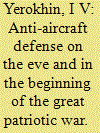

|
|
|
| 2 |
ID:
090470


|
|
|
|
|
| Publication |
2009.
|
| Summary/Abstract |
Military science has always tried to interpret war in terms of a philosophical category, identity the conditions and factors affecting it, and look into patterns and laws governing the origins, course, and outcome of war.
Going to the true causes of war and the most typical differences generating tensions in political and economic relation between countries culminating and manifesting in war between them in the principal challenge of this scientific search. A very important consideration here is to evaluate correctly the scope of influence that the potentialities of the warring countries, specific of the theaters of operation, and the opponents ' political aims have on he general character of future wars and their course and end results
|
|
|
|
|
|
|
|
|
|
|
|
|
|
|
|
| 3 |
ID:
048150
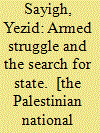

|
|
|
|
|
| Publication |
Oxford, Oxford University Press, 1999.
|
| Description |
xlii, 953p.pbk
|
| Standard Number |
0198296436
|
|
|
|
|
|
|
|
|
|
|
|
Copies: C:1/I:0,R:0,Q:0
Circulation
| Accession# | Call# | Current Location | Status | Policy | Location |
| 042606 | 956.9405/SAY 042606 | Main | On Shelf | General | |
|
|
|
|
| 4 |
ID:
118334
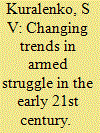

|
|
|
|
|
| Publication |
2012.
|
| Summary/Abstract |
The author surveys the experience gained by armed forces in military conflicts fought in the last few decades, and deliberates on the expected changes in the nature of armed struggle in future military conflicts.
|
|
|
|
|
|
|
|
|
|
|
|
|
|
|
|
| 5 |
ID:
184631
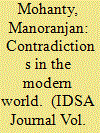

|
|
|
| 6 |
ID:
183430
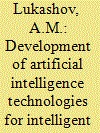

|
|
|
|
|
| Summary/Abstract |
. This article deals with the main trend in improving the efficiency of weapons and military equipment in conditions of changing technological modes - namely, the development of artificial intelligence (AI) technologies in the interests of creating intelligent combat systems (ICS) as a promising means of armed struggle in the 21st century. It defines the main factors that determine the relevance of artificial intelligence technologies development in the interests of creating intelligent weapon systems, as well as their general characteristics, role, and place in ensuring the national security of the Russian Federation.
|
|
|
|
|
|
|
|
|
|
|
|
|
|
|
|
| 7 |
ID:
067627


|
|
|
| 8 |
ID:
147385
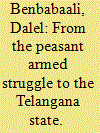

|
|
|
|
|
| Summary/Abstract |
On 2 June 2014, Telangana was carved out of Andhra Pradesh and became the 29th State of the Indian Union after a longstanding campaign for autonomy. This redrawing of State boundaries, like the ones that preceded it in 2000 with the creation of Uttarakhand, Chhattisgarh and Jharkhand, was not merely about administrative reorganization in favour of smaller States and better governance, but a consequence of multiple factors involved in the construction of regional identities (Tillin 2013 Tillin, L. 2013. Remapping India. New States and Their Political Origins. Delhi: Oxford University Press.
[CrossRef]
).
|
|
|
|
|
|
|
|
|
|
|
|
|
|
|
|
| 9 |
ID:
034406
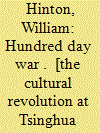

|
|
|
|
|
| Publication |
New York, Monthly Review Press, 1972.
|
| Description |
288p.hbk
|
| Standard Number |
853452385
|
|
|
|
|
|
|
|
|
|
|
|
Copies: C:1/I:0,R:0,Q:0
Circulation
| Accession# | Call# | Current Location | Status | Policy | Location |
| 011343 | 951.057/HIN 011343 | Main | On Shelf | General | |
|
|
|
|
| 10 |
ID:
138126
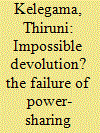

|
|
|
|
|
| Summary/Abstract |
The concept of a ‘primordial homeland’ has been at the centre of Sri Lanka’s armed struggle, in which both Sinhalese and Tamil nationalisms have used claims of ancient and ethnically determined territories to justify their right to self-determination, territorial sovereignty and armed struggle. Through an analysis of historical power-sharing arrangements and the subsequent failures, this article will examine why there has been much difficulty in adapting power-sharing arrangements to the rigidity of the hegemonic ethnic order of Sri Lanka and how this, in turn, has had detrimental consequences for democratic stability and peace making. While recognising the role played by various international actors in pushing for power sharing in Sri Lanka, the article concludes with an analysis of India’s role in this debate, while analysing how devolution has become an important factor in shaping India’s foreign policy towards Sri Lanka.
|
|
|
|
|
|
|
|
|
|
|
|
|
|
|
|
| 11 |
ID:
118333
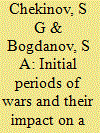

|
|
|
|
|
| Publication |
2012.
|
| Summary/Abstract |
The authors provide an overview of the initial periods of wars fought in the 20th and early 21st centuries, retrace their evolution, and take a look at what armed struggle could be in substance in the future; they also offer their views on the specifics of the initial period of new-generation wars.
|
|
|
|
|
|
|
|
|
|
|
|
|
|
|
|
| 12 |
ID:
141618
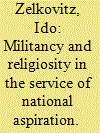

|
|
|
|
|
| Summary/Abstract |
As with other Arab identities, Palestinian identity is a product of myriad converging ideologies. In retrospect, its development was accompanied by dominant Middle Eastern ideologies, such as Arab nationalism, pan-Islamism and the rise of political Islam. Against this backdrop, the article discusses Islam's historical affinity and social role in the formative period of the Fatah revolutionary national movement. Both ideologically and socially, Islam was central to Fatah's ethic and served as an important tool for recruiting the masses to the Palestinian revolution.
|
|
|
|
|
|
|
|
|
|
|
|
|
|
|
|
| 13 |
ID:
131809
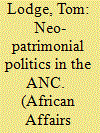

|
|
|
|
|
| Publication |
2014.
|
| Summary/Abstract |
Following Jacob Zuma's ascension to the presidency in South Africa, the African National Congress (ANC) has been dogged by rumours of escalating corruption and the personalization of power. This article documents these trends and explores three ways of understanding neo-patrimonialism in South Africa's ruling party. First, the article addresses the possibility that such political habits have a long history within the ANC but were restricted during its years in exile and have begun to resurface now that the armed struggle is over. Second, it considers explanations that relate to the party's historical ties to criminal networks and pressures arising from the transition to majority rule and contemporary electoral politics. Finally, the article investigates whether neo-patrimonialism is a reflection of broader tendencies within South African political and economic life. All three factors are found to have played a role in the rise of neo-patrimonial politics, and it is the confluence of these trends that explains why these dynamics have taken such a strong hold on the party.
|
|
|
|
|
|
|
|
|
|
|
|
|
|
|
|
| 14 |
ID:
139472
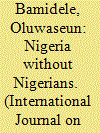

|
|
|
|
|
| Summary/Abstract |
This paper explores the processes of identity-making and nation-building in a multi-ethnic, multi recently facing a protracted armed struggle against ultra-militant and sub-ethnic groups.
|
|
|
|
|
|
|
|
|
|
|
|
|
|
|
|
| 15 |
ID:
095919
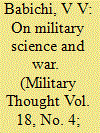

|
|
|
| 16 |
ID:
124819
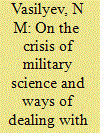

|
|
|
|
|
| Publication |
2013.
|
| Summary/Abstract |
The paper offers analysis of military science at the present stage, the causes of its critical state, and suggests various interpretations of the military science category and approaches to it.
|
|
|
|
|
|
|
|
|
|
|
|
|
|
|
|
| 17 |
ID:
132012
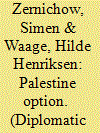

|
|
|
|
|
| Publication |
2014.
|
| Summary/Abstract |
Were the Palestinians anything more than simply a refugee problem? Since the creation of the State of Israel in 1948, the USA had pretty much ignored this haunting question. However, as the Palestinian guerrillas' wide-ranging armed struggle seemed to be approaching a climax in 1970, U.S. policy makers were forced to reassess whether they might also need to view the Palestinian issue as a political problem. In April to May of that year, U.S. State Department officials began to doubt whether the Jordanian regime would survive the civil war then brewing in that country. In response, a strategy paper examining the possibility of a joint Jordanian-Israeli-Palestinian settlement-a policy that would come to be known as the "Palestine" or "Palestinian option"-was developed within the U.S. State Department. Between October and December 1970, the National Security Council discussed various versions of this strategy paper. At the same time, members of the main Palestinian guerrilla organization, Fatah, sent messages to the Americans indicating that they might be willing to enter into negotiations. Why, then, did these efforts fail to bring about a change in U.S. policy toward the Palestinians?
|
|
|
|
|
|
|
|
|
|
|
|
|
|
|
|
| 18 |
ID:
124366
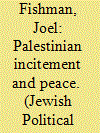

|
|
|
|
|
| Publication |
2011.
|
| Summary/Abstract |
Persistent reports describe the pervasiveness and intensity of Palestinian incitement against Israel. The Palestinian Authority is an oligarchy whose purpose is war against Israel. Its leaders consider deception and the "armed struggle" as the legitimate means by which they can achieve their goals and have adapted their educational system to fill the younger generation with hatred and the desire to perpetrate terrorist acts. Because of the reality behind it, incitement is the real "deal-breaker." One side wants peace, while the other does not.
|
|
|
|
|
|
|
|
|
|
|
|
|
|
|
|
| 19 |
ID:
158823
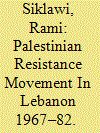

|
|
|
| 20 |
ID:
128072
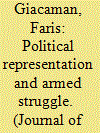

|
|
|
|
|
| Publication |
2014.
|
| Summary/Abstract |
In 1974, both the Arab League and the United Nations recognized the Palestine
Liberation Organization (PLO) as the "sole, legitimate representative of the
Palestinian people." This article explores the dynamic history of the PLO's
methods of political representation from its establishment in 1964 through the
height of the armed struggle in the mid-seventies. Contrasting fedayee theories
of political representation with their practice, the author draws upon a range
of ideological documents produced by different guerrilla factions, as well as
accounts from prominent actors in the movement.
|
|
|
|
|
|
|
|
|
|
|
|
|
|
|
|
|
|
|
|
|